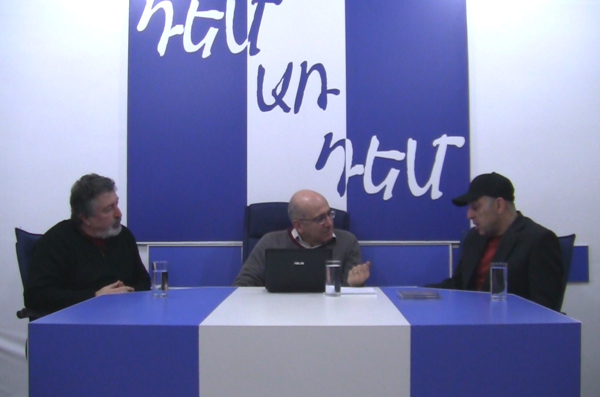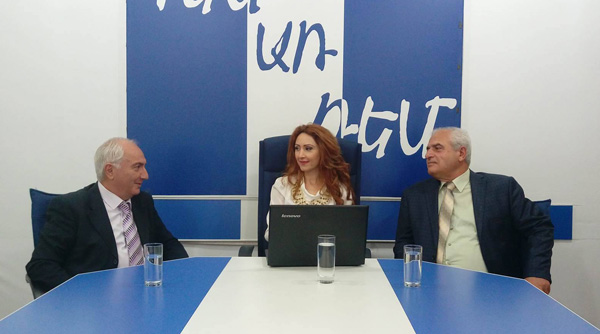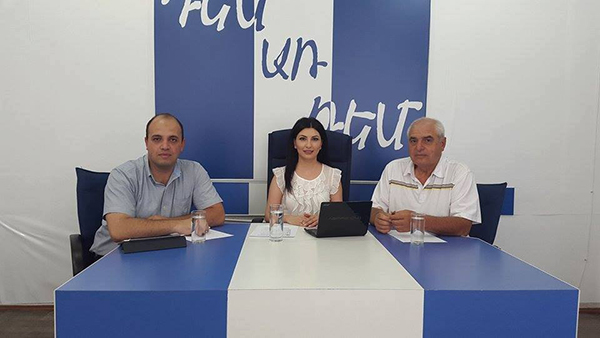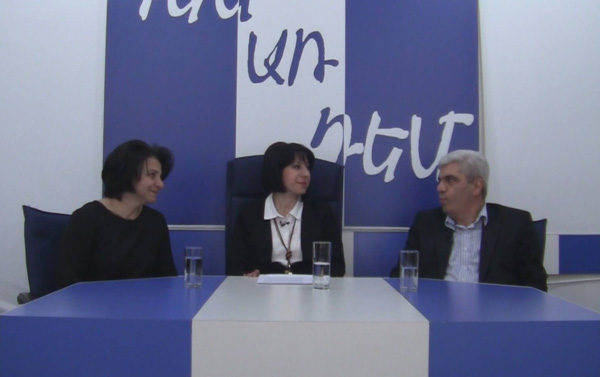The theme of “Aravot” online “Face to Face” talk show is discussed by artist Sahak Poghosyan and musician Ara Gevorgyan
Aram Abrahamyan – What is our purpose? Do we want to prove something by marking the Genocide Centennial? It seems we do not have a problem of convincing each other. Do we want to remind the world that genocide did happen, or we want the Turks to understand that they did the genocide, and repent?
Sahak Poghosyan – You know, Genocide is such a big and painful issue that to say it in short of what we want is very difficult in my opinion. We still do not know what we want, it is possible that separate individual, one by one, knows what he wants, but overall, as I have observed, the impression is that we ourselves do not know what we want. As an individual, I am two-sided, in other words, when my two grandmothers and 2 grandfathers were survivors of the genocide, and I bear the pain and suffering and the history of this families in me, I carry all of this in me as an artist. I have prepared a project for the Genocide Centennial, which is called “The Silence in My Grand Mother’s Eyes.” This is a rather serious project, it represents 11 pictures that are displayed on the wall. They are blankets covered with oil and under the layer of wax. I recall the stories saying that they could have only that to cover our kids in the Deir ez Zor. A. A. – What do we want? Do we remind the world? Do we put the Turks to shame? Do we strengthen our souls?…
Ara Gevorgyan – However, in my opinion, first of all for me, at least, it is the preservation of our national dignity, raising it high. We do not lie to the world and we have not done it until not. The Turks argue the opposite that there was a war, but there was no genocide, but since the time has put everything it its place with evidenced and everything else, I believe that first of all it is necessary to restore the historical truth.
Read also
A. A. – Tell us about your project.
A. G. – I have started my project long ago, I have repeatedly said, how long we can speak about the Genocide in Armenian, nothing will change of it, we should speak in a foreign language. I myself prepared a CD with a song condemning genocide in ten languages. I have released this CD in 2005, and today, it is ready in 20 languages, of which I want to refine and drop down to 15 languages to be symbolic that 10 nations condemn the 1915 atrocity. Daniel Decker is the author of the text and the singer of the English version, he is a famous man. He was reading books in Armenian for exactly 1 year, also the history about the genocide and various web sites that tell about the Genocide. He was insisting, “I must learn more so that my written text would be more correct.” The text denotes two directions that we are destroyed and killed, because we are also Christians, I think it is very important that it is said by an American man, and the song ends with the text that the crime is still not condemned.
A. A. – We were massacred, but when we speak too much about it, we experience negative emotions. I’m afraid that if we take too much these negative emotions on us at the Centennial, we, about 10 million Armenians, would experience a psychological stress, but it would be an event for the world, which will pass away.
S. P. – I have lived “outside” over 20 years and know very well how people there treat this issue. When we make a show of this genocide idea and even mark the days, I have seen a negative attitude among the foreigners, in other words, they treat Armenians as if begging for something, demanding something from the world, from the offended world. I personally, as an Armenian, would not like to have such a feeling. I would not like to be viewed as depressed, expropriated, massacred and murdered, because ultimately I myself do not want to be a victim, I do not want to live with a sense of a victim.
The full discussion here:
Prepared by ARAM ABRAHAMYAN
“Face to Face” talk show series are released by the Open Society Foundations- Armenia. The views and analyzes found in this broadcast express the opinions of the participants, and are not approved by the Open Society Foundations-Armenia, or its Board. This broadcast is made available thanks to comprehensive financial support by the Open Society Foundations-Armenia, under the mass media support program, grant No 18624.























































